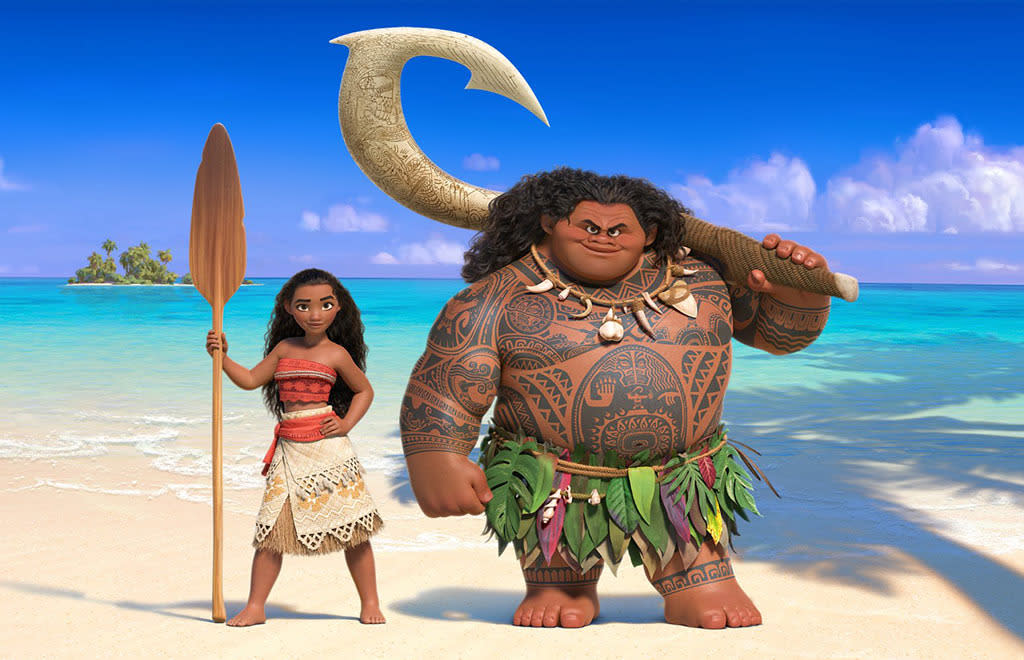Critics Are Calling Out Disney for Fat-Shaming Polynesians With ‘Moana’ Character

Disney has come under fire for its depiction of a Polynesian character in the upcoming movie Moana. (Photo: Walt Disney Animation Studio)
When Moana is released on November 23, 2016, the title character will be the first Disney princess of Polynesian descent. However, the look of the heroine’s sidekick, the demigod Maui, is creating a firestorm of criticism months before the film’s release.
According to New Zealand politician Jenny Salesa, the body shape of Maui is cause for concern. “When we look at photos of Polynesian men and women from the last 100-200 years, most of our people were not overweight and this negative stereotype of Maui is just not acceptable,” she writes on Facebook. “No thanks to Disney.”
Salesa calls Maui’s depiction “obese,” and thinks children might get the wrong message about their bodies. “The environment our kids grow up in and what they are exposed to have a role to play. Disney movies are very influential on our children. It is great that Moana is the lead. However, it is disappointing that Maui, one of our beloved historical ancestors from hundreds of years ago, who was a very strong man [and] a skilled navigator, is depicted to be so overweight in this kids’ movie.”

Facebook user Eliota Fuimaono-Sapolu posted this photo, comparing the body shape of the demigod Maui in the upcoming movie Moana to those of real-life Polynesian actors. (Photo: Facebook/Eliota Fuimaono-Sapolu)
The parliament member’s comments have created a whir of debate. One Facebook user said, “I agree and am surprised that they still didn’t change the image even though voiced by Dwayne Johnson, who I hope raised issues about it. Still looking forward to seeing it.”
Another did not agree with Salesa’s sentiments in the slightest. “It’s not a negative stereotype,” she wrote. “All people come in different sizes and shapes. They are just showing a different body type that some Polynesians do have. Sorry it is not the stereotypical one you dream up … not all of them can be that perfectly chiseled. Maui can be strong and bigger.”
According to Karla Ivankovich, PhD, an adjunct professor of psychology at the University of Illinois, Springfield, and expert on racial depictions and stereotypes in the media, this is not Disney’s first go-round with fat-shaming accusations. “Some time ago, there were reports of a collaboration between Disney and Blue Cross and Blue Shield,” she tells Yahoo Beauty. “The intention was to help children make better lifestyle choices. The campaign featured apps and websites including ‘buff, virtuous’ characters Will Power and Callie Stenics squaring off against nemeses like the lazy, grotesque Lead Bottom and the transparently-named Glutton.”
Unfortunately the efforts were “not as well received as BCBS or Disney had hoped,” Ivankovich says. “They were actually viewed as offensive, discriminatory, and served to ‘pick up where the schoolyard bully left off.’” The websites and apps were quickly removed.
Ivankovich is a strong advocate in preventing the “pervasive nature” of obesity stigmatization in culture and the media. “Proponents of ‘fat-shaming’ think that obese individuals would be best served if they could be given a ‘dose’ of shame,” she says. “They hold the belief that the individual would be more likely to drop unhealthy weight as a means of gaining societal acceptance. Recent research suggests that weight stigma precipitates weight gain and increased calorie intake as well as other psychological correlates, such as lower self-esteem and depression.”
That said, Ivankovich doesn’t believe Maui is depicted inappropriately. “When I saw the character, I did not see a fat man,” she says. “I saw a strong man who would easily fit the male stereotype of hunter, gatherer, and provider. Now, when I read what’s out there, I can see how some might be offended — but it’s drawing inferences that not everyone else might share.
Polynesian writer Leah Damm thought about Maui’s onscreen persona for days and does understand where Salesa is coming from. The legendary demigod did not technically look like he does in the Disney film, and the filmmakers chose to deviate from his traditional stature. “Today, the negative stereotype of Polynesian people is that our size relates to our poor life choices,” she wrote for The Spinoff. “The ‘poor life choices’ argument is the crux of the racist justification of coloured people’s overrepresentation in negative social statistics, and the scapegoat for the taxpayer who doesn’t want their hard-earned dollars spent on poor decision making.”
At the end of the day, though, Damm does not see Maui’s depiction as negative. She’s not so sure that men like Dwayne Johnson and Jason Mamoa represent the typical Polynesian male, or perhaps reinforce a better model for the young men of her culture to aspire. “There’s a very clear difference between saying Maui wouldn’t have looked like that and Maui shouldn’t look like that [which sends the message that] big Polynesians are a disgrace to our ancestors and have no place being seen by young audiences,” Damm explained.
She thinks that in some ways parents should be happy to see a new body type onscreen for their children. “Personally, I don’t look at the animated Maui and think ‘unhealthy,’” Damm wrote. “I get more of a ‘strong, bodyguard-type’ vibe … a number of people have noted that Maui looks like their Dads and Uncles. Imagine what this might mean to Polynesian kids, to have a brief escape from their Dads’ likeness being limited to anti-smoking campaigns, and finally seeing an iteration of large, strong Polynesian men on the big screen, navigating oceans and bringing joy to young audiences.”
Let’s keep in touch! Follow Yahoo Beauty on Facebook, Twitter, Instagram, and Pinterest.

